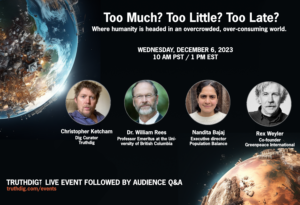Proposed Mars Journey Highlights ‘How Unequal Our Planet Still Is’
"Humanity does not progress by jumping into space and leaving the cares of Earth behind," writes Nigerian author Chibundu Onuzo. "We move forward by creating a more equitable and compassionate planet for now and generations unborn." Cyril-Rana!! (CC BY 2.0)
Cyril-Rana!! (CC BY 2.0)
On browsing the list of 100 candidates who made the shortlist for a proposed one-way trip that will carry 40 lucky earthlings to Mars, Nigerian writer Chibundo Onuzo was struck by what she described as a disturbing, misplaced and narrow-sighted rhetoric of progress. She writes in The Guardian of the attitude that prevailed among the candidates.
Going to Mars will move humanity forward and open up new frontiers; it will be a veritable leap for mankind. I watched a woman look forward to the day her statue will be planted on Mars’s red soil in honour of her services to mankind. I watched a father willing to leave his wife and children behind for a chance to make this jump for humanity. I watched a young man speak of his application as a “sacrifice” for the rest of us. Through the glories of modern science, mankind is once again forging ahead.
Then I thought of my village in south-eastern Nigeria. The roads are not paved, the electricity supply is erratic and infant mortality is high. Are my townspeople included in this great leap for mankind? Have their lives changed since the last alleged leap, Armstrong’s slow walk across the moon? They use candles in a world where there are light bulbs. Their children die of infection in a world where there is penicillin. Yes, sometimes, technology trickles down. You would be hard pressed to find someone in my village without a phone, but charging it, that’s another issue.
By and large, modern science has never been in their interest or the interest of the 2.6 billion people without access to running water or the millions, who despite breakthroughs in agriculture and farming, are still starving in 2015. Much of scientific discovery is for the betterment, amusement and the curiosity of a lucky few in this world who are either born in the parts we call the first world, are middle class or affluent enough to afford it.
“We are not living in the cold war period,” Onuzo continues. “Prestige is no longer measured by how many of your citizens you can fling into space. National prestige is based on the wellbeing of your citizens, their access to healthcare, education, a balanced diet, running water, electricity and affordable housing. These are the banalities of national prestige.”
— Posted by Alexander Reed Kelly.
Your support matters…Independent journalism is under threat and overshadowed by heavily funded mainstream media.
You can help level the playing field. Become a member.
Your tax-deductible contribution keeps us digging beneath the headlines to give you thought-provoking, investigative reporting and analysis that unearths what's really happening- without compromise.
Give today to support our courageous, independent journalists.






You need to be a supporter to comment.
There are currently no responses to this article.
Be the first to respond.